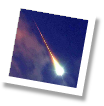Acoustic and detonating meteors
The detonating meteor – an interesting field of research The investigations of the ERFM to meteorite fall events in Europe also always afforded interesting data of the corresponding detonating meteor. Those noises are propagating with the speed of sound, so that a detonation is reaching the observer only longer time after the light phenomenon. When a meteor is detonating, then it can be a huge bang or a deep rumbling of thunder. The noises attest to the fact that the meteor could achieve a quite low terminal altitude (we estimate this altitude to less than 35km). Therefore a detonating meteor is always the requirement for a meteorite event, although on the other hand a meteorite fall after a detonation is not absolutely a consequence. Depending on what just happened, it could bang several times, even crackle, rhythmic drumming or bumpy thunder, so like hearing a lot of explosions in quick succession. This is also a very interesting point in seismic regard, since already quite often thereby the ground came into vibrations. Of course it also depends on where you are located as a witness. The noises are short or long lasting, respectively with high or low sound intensity. In general at first you hear the end of supersonic flight phase, because this section of the flight generally closest to the observer. Ultimately, with an exact observation of the rumbling one can backtrack the intruder (which is apparently flying backwards) to the beginning of the meteor, because the sounds from increasing air levels also take more time in order to reach the witness. It sounds like this, how to remove the aircraft. Often the meteor event itself remains unobserved in broad daylight. Only in consequence of the rumbling everybody is looking up at the sky to find out, what happened. Although the rumbling is arriving already quite delayed in the position of a distant witnesses. Perhaps there is a period of more than 5 minutes between meteor appearance and the rumbling. On the other hand, at a close range the sonic boom already can set in within a few seconds and be very intense. That close and hard shock wave is surprisingly vigorous and can be destructively in a limited extent or can set different things in motion. As already mentioned, detonating meteors can quite cause trembles of the air, so that seismic and infra-sound recording systems could analyse and locate those events very well. Unfortunately this happened very rarely up to now. The tremble which is generated by the meteor occurred in a quite localised area and it is perceivably only by witnesses who are located directly beneath the fall event. Large buildings, such as walls, roofs and windows can easily vibrate and thus can be stressed more or less dynamically. When the meteoroid is passing the atmosphere, then it is squeezing the normal air space. In this situation there are extreme pressure differences between the shock wave in front of and the vacuum behind the meteoroid, respectively in front of or behind the resulting meteorites. These must and will be swiftly equalised. Strong air turbulences are spreading out from the penetrating channel into the normal airspace. All of these air movements generate the trembles . The acoustic meteor - an unexplored phenomenon In contrast to the detonating meteor, where sounds are to be heard only longer time after the light phenomenon, in a case of an acoustic meteor you can perceive immediately more or less noticeable sounds. You can hear sounds e.g. like a crackling, a hiss, a noise, a hum or a drone, at which the noises probably caused by an electromagnetic radiation that is generated in the ear. An acoustic meteor is usually a longer lasting blazing fireball or even a meteor, which initiates a meteorite fall event. A person, who is a witness of such an event, can also detect the meteor in an acoustic way. Usually, these people are first pointed out acoustically, that something just happens, and then they look up and will see the passing of the meteor. Not every person is apparently able to hear. These sounds have no connection with the environment | ||||
 | ||||
Meteoric Science

![]()
![]()


![]()






